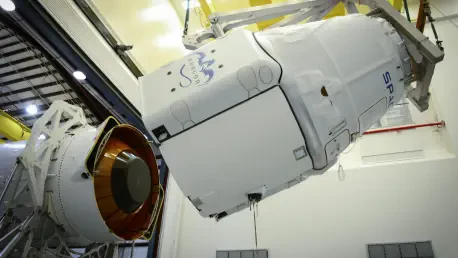The solid rocket motor (SRM) industry has reached a pivotal juncture, marked by the profound impact of Artificial Intelligence (AI) across various sectors. SRMs, known for their reliability and high thrust output, have long been indispensable to aerospace and defense applications. However, the growing demand for more efficient and safer propulsion systems has sparked an integration of AI technologies that promise to revolutionize SRM development and deployment. AI’s emergence as a transformative tool in this field has brought advancements in design optimization, propellant formulation, predictive maintenance, and quality control. These developments are redefining industry standards and processes, enhancing performance while ensuring higher levels of safety. The utilization of AI-driven technologies presents not just improvements but a complete overhaul of several key components within the industry, paving the way for faster, more reliable, and more precise solutions. As AI continues to evolve and expand its capabilities, its influence on the SRM industry is poised to grow, signifying a new era in aerospace and defense propulsion systems.
AI-Driven Design and Propellant Formulation
Amid the SRM sector’s strides, AI has notably impacted the design and development phases. AI algorithms, with machine learning models at their core, analyze vast datasets to determine optimal design parameters. This process allows engineers to simulate diverse design scenarios and predict performance outcomes, streamlining the design process significantly while slashing costs associated with traditional trial-and-error approaches. By harnessing AI, engineers can swiftly narrow down design configurations that offer the best efficiency and reliability, paving the way for tailored solutions that cater to specific mission requirements.
Propellant formulation, crucial to SRM performance, has equally benefited from AI’s prowess. Traditionally, this process involved extensive experimentation and testing to understand the chemical behavior of propellants under varying conditions. AI now enables a comprehensive analysis of chemical compositions, leveraging machine learning models to forecast their behaviors. Such abilities permit the simulation of combustion processes without exhaustive physical tests, leading to faster development cycles and improved safety. AI-driven insights enhance the ability to identify optimal formulations, ensuring SRMs meet stringent efficiency and performance standards.
Predictive Maintenance and Quality Control
AI’s role in enhancing SRM reliability is particularly evident in predictive maintenance strategies. Maintenance is crucial for ensuring that SRMs operate safely and efficiently throughout their lifespan. AI technologies facilitate predictive maintenance by continuously monitoring system parameters and proactively identifying potential issues before they escalate into failures. Harnessing data from sensors that monitor temperature, pressure, and vibration, AI algorithms reveal anomalies, allowing for timely interventions that minimize downtime and extend operational lifespan.
Similarly, AI-driven automation has transformed quality control and manufacturing accuracy in the industry. Through real-time inspection processes, AI helps detect and rectify defects during manufacturing. The employment of computer vision systems ensures products meet quality specifications with fewer human errors. By automating these processes, manufacturers can bolster precision and consistency, consequently enhancing overall production efficiency. AI’s influence also streamlines manufacturing processes, reducing the time and resources required to achieve high-quality outcomes.
Thrust Vector Control and Supply Chain Optimization
Thrust vector control systems, essential for rocket maneuvering, have seen innovations due to AI’s intervention. AI analyzes flight data in real time, allowing these systems to adjust control surfaces dynamically, maintaining stability and trajectory throughout flights. Algorithms that predict aerodynamic forces optimize control responses, bolstering flight accuracy and safety. The application of AI in thrust vector control exemplifies its capacity to enhance flight performance, providing essential tools for effective navigation and stability during launches.
AI has also optimized supply chain and logistics operations within the SRM industry. Predictive analytics empowered by AI play a crucial role in managing inventories, forecasting demand, and identifying potential disruptions. By facilitating data-driven decision-making, companies can ensure timely delivery of materials and efficient production schedules while reducing costs. AI’s involvement substantially improves operational efficiency and strengthens the industry’s capability to meet customer demands and adapt to changes quickly, safeguarding against potential setbacks.
Simulation, Testing, and Market Analysis
AI-driven simulations offer a groundbreaking alternative to resource-intensive SRM testing methods. These simulations model diverse scenarios and predict outcomes, replicating extreme conditions to assess performance without engaging in physical tests. This approach accelerates development phases, offering insights into potential issues and enhancing reliability. By providing cost-effective solutions to traditional testing processes, AI-driven simulations supplant the need for exhaustive physical tests without compromising accuracy or detail.
In market forecasting and competitive analysis, AI proves invaluable in examining market trends and shaping strategic plans. By analyzing market data, customer behavior, and competitor activities, AI can project demand and identify opportunities for growth. Companies leverage these insights to adapt to evolving market conditions and construct robust competitive strategies, ensuring they make informed investment decisions that fuel innovation and advancement in the SRM sector. AI’s analytical capabilities drive significant progress in understanding industry dynamics.
Launch Decision Support Systems and Compliance
The solid rocket motor (SRM) industry is at a crucial stage as Artificial Intelligence (AI) influences various sectors. Traditionally valued for their reliability and substantial thrust, SRMs have been core to aerospace and defense efforts. Yet, growing needs for safer, more efficient propulsion systems are driving the incorporation of AI into SRM advancements. AI is emerging as a transformative powerhouse in optimizing design, formulating propellants, predicting maintenance, and controlling quality. This integration is reshaping industry benchmarks, enhancing performance, and enforcing higher safety standards. AI technologies are not merely offering improvements; they are fundamentally redefining several vital industry components to produce faster, more reliable, and accurate solutions. As AI continuously evolves, its impact on SRM is likely to widen, heralding a fresh chapter in aerospace and defense propulsion technologies. This shift promises to overhaul traditional processes, ushering in innovative practices and techniques tailored to modern demands.









